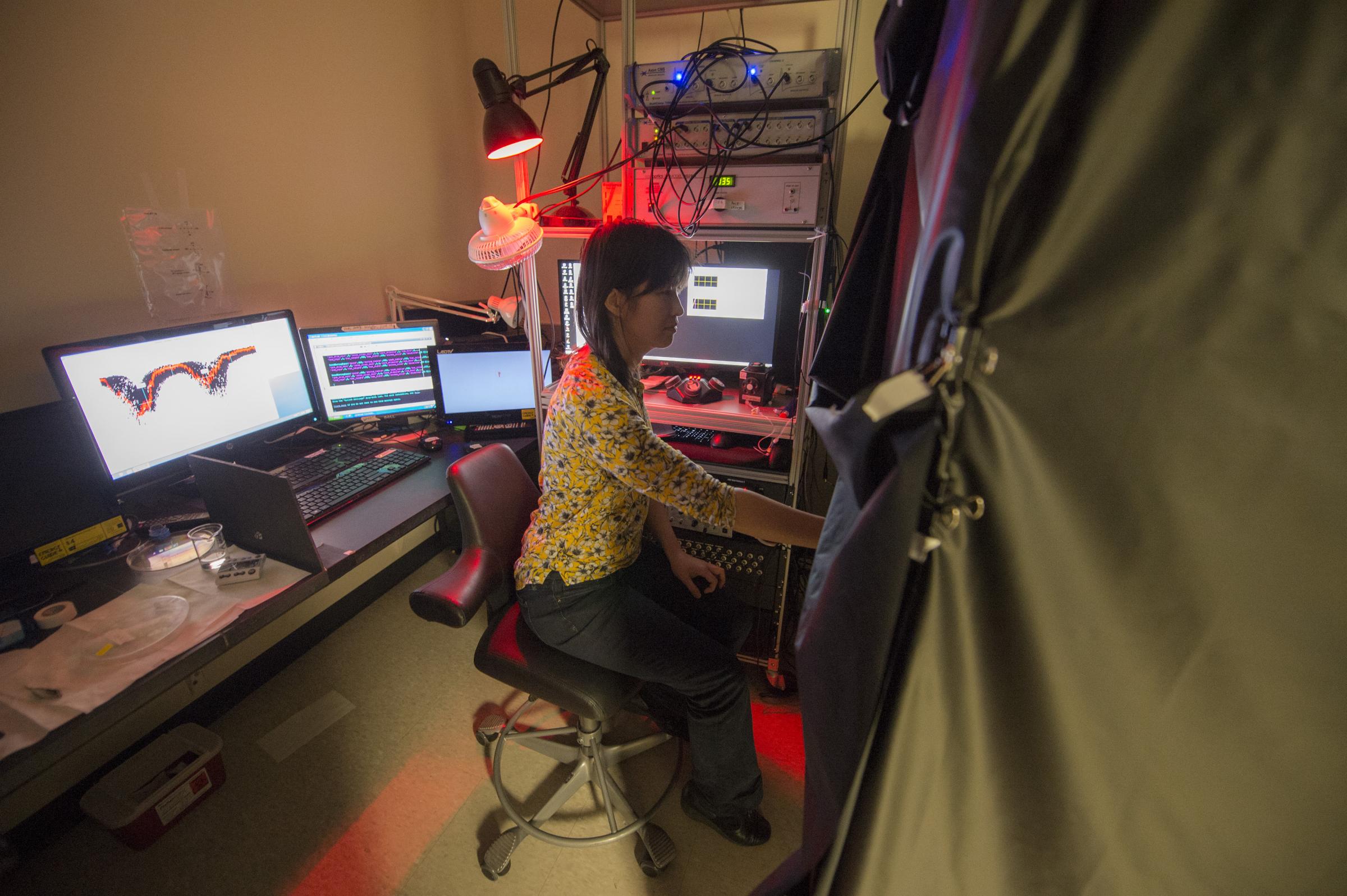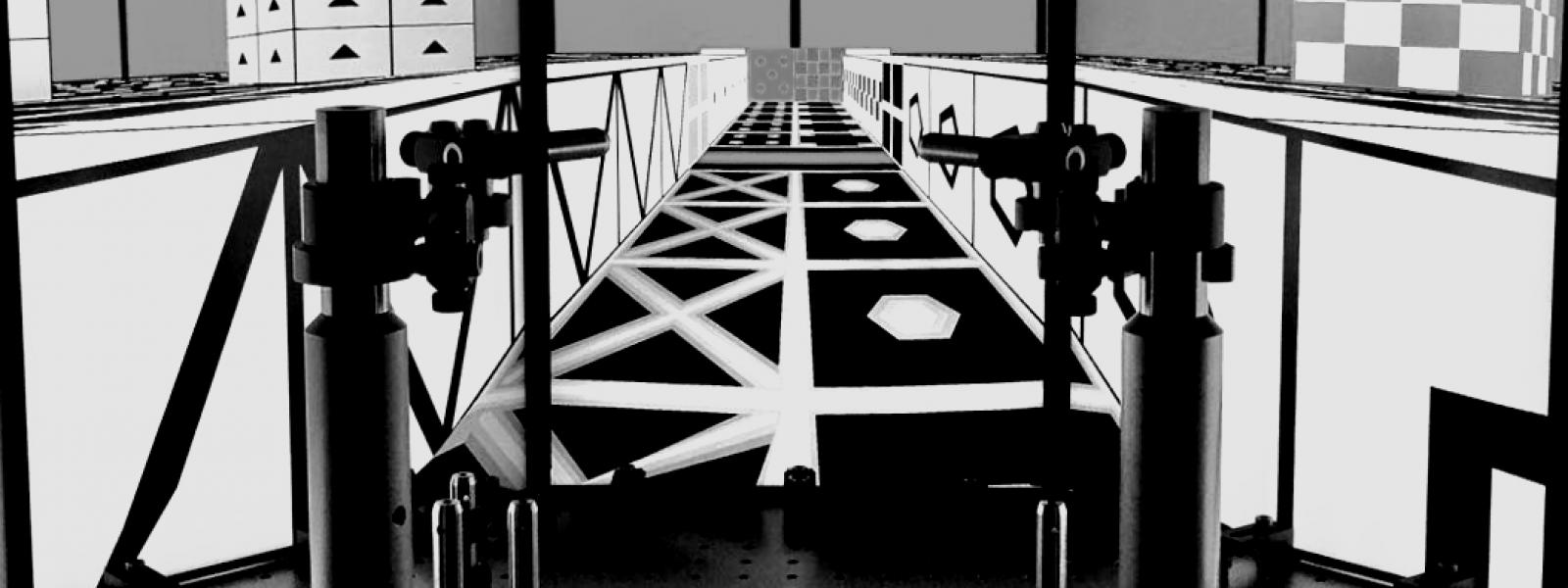Students have an opportunity to transform knowledge learned in the classroom into tangible skills and to experience science as an evolving truth by engaging in research. Under the supervision of Neuroscience faculty, students develop valuable scientific techniques and problem solving skills while learning to function independently in a laboratory setting.
Students can work in a laboratory setting through several mechanisms. Interested students should do online research, utilize the CCRF resource, and read faculty and lab web pages to get a sense of the kind of research being done on campus. Undergraduates pursuing a BS with Honors in Neuroscience will be required to complete experimental research within a laboratory setting.
Here are some tips on how to get started and what opportunities are available:

OUR NEW FACULTY MEMBERS ARE OPEN AND LOOKING FOR UNDERGRADUATE STUDENTS!

Visit the Faculty page to learn more about them.
FUNDED RESEARCH OPPORTUNITIES
TRAINING IN THEORY AND COMPUTATION FOR NEXT GENERATION NEUROSCIENTISTS
The Undergraduate Training Program in Computational Neuroscience (TPCN) provides an introduction to research in Computational Neuroscience. Students will spend a full year working on a funded computational research project under the supervision of a select Neuroscience faculty member. The program culminates in an oral presentation. Students will also attend a series of seminars and laboratory visits designed to introduce them to a wide range of neuroscience research topics throughout the year. The deadline for applications is March 20th, 2026.
SUMMER Internships & Fellowships
Neuroscience research metcalf internship
Once accepted, student interns are expected to work full-time in a Neuroscience laboratory on campus, toward completion of their proposed project. Interns must also participate in faculty-led weekly meetings. The 10-week program occurs during the summer quarter and students may not register for any courses during this time. A $5,500 stipend is awarded to accepted applicants. The deadline for applications is March 20th, 2026.
Click the Handshake link for the application and more information: 2026 Neuroscience Research Metcalf.
All applicants must submit faculty recommendation information via email to neuromajor@uchicago.edu.
The Metcalf Internships provide opportunities for students to conduct independent research during the summer. This opportunity is competitively awarded to 2nd and 3rd year UChicago students majoring in Neuroscience. Students must work with a UChicago faculty member (= Principal Investigator or P.I.) to develop an original project that is feasible within the confines of this 10-week program.
Once accepted, student interns are expected to work full-time in a Neuroscience laboratory on campus, toward completion of their proposed project. Interns must also participate in faculty-led weekly meetings. The 10-week program occurs during the summer quarter and students may not register for any courses during this time. A $5,000 stipend is awarded to accepted applicants.
Click the Handshake link for the application and more information: 2023 Neuroscience Research Metcalf. The deadline to apply is April 9th, 2023.
All applicants must submit faculty recommendation information via email to neuromajor@uchicago.edu.
Developmental Neurobiology undergraduate fellowship
Students will be required to perform 10 weeks of full-time research in their host labs, as well as various other responsibilities. Fellows will receive a $5,500 stipend. In addition, the host laboratory will receive funds to cover expenses related to travel, room, and board related to conference attendance. The deadline for applications is March 20th, 2026.
Click the Handshake link for the application and more information: 2026 BSCD Developmental Neurobiology Undergraduate Fellowship.
Letters of recommendation are to be emailed to neuromajor@uchicago.edu.
bscd fellowships in quantitative biology
The Quantitative Biology Summer Research Fellowship is an opportunity for students to complete a research project in any field of biology (e.g., ecology and evolution, systems biology, statistical genetics) using quantitative tools (e.g. statistical, computational, or mathematical methods). The research projects will be primarily computational in nature, although students may also engage in experimental data collection to support their aims.
In addition to working on research, students will take part in a regular student-led seminar facilitated by D. Kondrashov with the aim of acquiring new quantitative skills to support their research progress. The goal of the program is to create a community of undergraduate scholars and provide them with an intensive, interdisciplinary research and learning experience.
Click the Handshake link for the application and more information: 2026 BSCD Quantitative Biology Summer Fellowship. The deadline for applications is March 20th, 2026.
For program details and additional application requirements, please review the BSCD Undergraduate Research Opportunities webpage.
The Leadership Alliance is a consortium of more than 30 institutions who have provided research and networking experiences to more than 4,000 young scholars with the aim of increasing the participation of underrepresented minority groups in higher levels of education and research. The Leadership Alliance’s Summer Research Early Identification Program (SR-EIP) is a rigorous summer research experience specifically designed for undergraduates interested in pursuing a PhD or MD/PhD. SR-EIP participants have the opportunity to conduct an independent research project for nine weeks under the guidance of a research mentor.
Required Materials for Application
- Biographical and academic information
- Current resume
- Statement of Purpose
- Two letters of recommendation
- Official transcripts
For program details and additional application requirements, please review the Leadership Alliance webpage here.
The Neuroscience Early Stage Scientist Training Program (NESSTP) Metcalf internship supports independent research during the summer quarter for UChicago undergraduate students from under-represented groups who have an interest in Neuroscience research. No research experience is required. Interns are expected to work full time in a neuroscience laboratory on campus, toward completion of their proposed project, and participate in weekly meetings.
The 10-week program occurs during the summer quarter and students may not register for any courses during this time. A $5,000 stipend is awarded to applicants. Click the Handshake link for the application and more information: 2023 Neuroscience Early Scientist Training Program Metcalf Internship.
The deadline to apply is April 9th, 2023.
Applications for Summer 2023 are now closed.
It is only through directly experiencing
the joys and tribulations of the research process
that students can discover their own affinity for
and interest in laboratory work.

College Center for Research and Fellowships
The College Center for Research and Fellowships (CCRF) helps undergraduates in the College navigate the broad array of institutional, domestic, and international undergraduate research opportunities that are available to them. Faculty-mentored research experiences complement and deepen academic work done in the classroom and provide students with key skills that prepare them for national and international fellowships, graduate study, and diverse careers.
In support of undergraduate research, the CCRF organizes and runs:
- Quarterly Undergraduate Research Information Sessions
- Research Grant Programs (Quad Scholars, Straetz International, Conference)
- Annual UChicago Undergraduate Research Symposium
- Additional Resources and Information about Research Opportunities and Funding (incl. a Research Opportunities Database)
The CCRF also provides intensive support to College students as they prepare for nationally competitive fellowships. These prestigious opportunities fund graduate study, research, foreign language acquisition, and much more. Students are encouraged to apply for the following opportunities, among many others
- Amgen
- DAAD German Academic Exchange RISE Program (Research Internship in Science and Engineering)
- Churchill Scholarship
- Fulbright US Student Program
- Gates-Cambridge Scholarship
- National Science Foundation Graduate Research Fellowships
- Arley D. Cathey International Graduate Study Fellowships
- Quarterly National Fellowship Information Sessions
